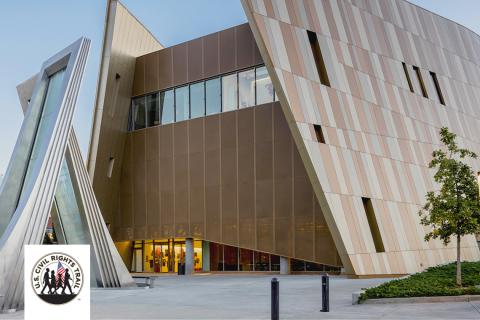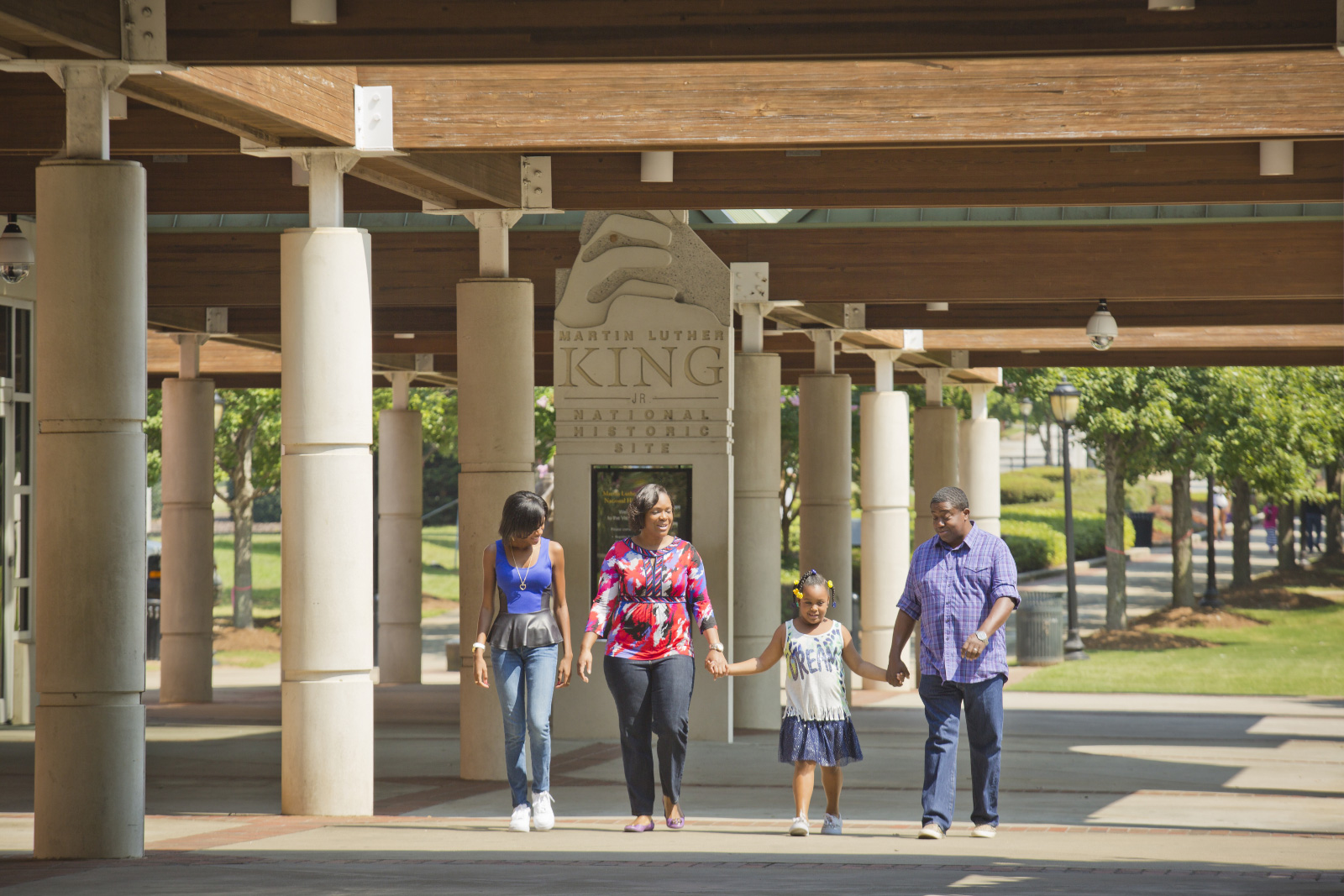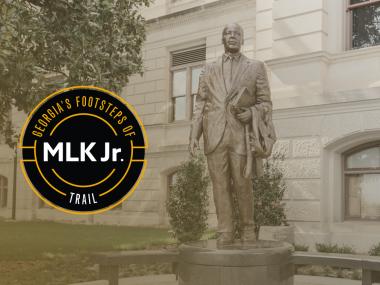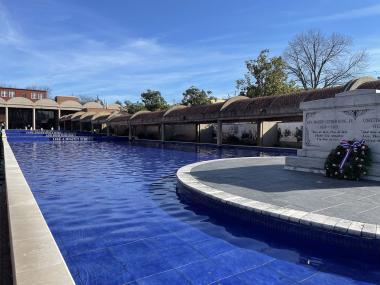12 Must-See Stops on the U.S. Civil Rights Trail in Georgia
Follow the U.S. Civil Rights Trail to 12 sites in Georgia from Martin Luther King, Jr.'s birthplace and gravesite in Atlanta to one of his key meeting places on the coast.
The U.S. Civil Rights Trail is a collection of more than 100 churches, courthouses, schools, museums, and other landmarks in the Southern states and beyond that played a pivotal role in advancing social justice in the 1950s and 1960s, shifting the course of history. The 12 sites on the trail in Georgia include the birthplace of Dr. Martin Luther King Jr. in Atlanta, historic churches in Albany that led a grassroots campaign to end discrimination in southwest Georgia, and a historic school and meeting place for civil rights leaders in Midway on the Georgia coast.
The 12 attractions in Georgia on the U.S. Civil Rights Trail are located in three cities. Jump to:
- Albany Civil Rights Institute
- Shiloh Baptist Church
- Martin Luther King, Jr. National Historical Park
- Martin Luther King, Jr. Birth Home
- The King Center
- Ebenezer Baptist Church
- Madame C.J. Walker Museum/WERD Studio
- APEX Museum
- Elbert P. Tuttle United States Court of Appeals Building
- National Center for Civil and Human Rights
- The Carter Center
- Dorchester Academy Boys' Dormitory
Learn more about the civil rights landmarks below, and plan your trip to explore historic locations and significant events in the American Civil Rights Movement in Georgia.
Find more trip ideas to learn about African American Heritage in Georgia on ExploreGeorgia.org.
Albany
Albany Civil Rights Institute

Visit the Albany Civil Rights Institute (formerly known as the Albany Civil Rights Movement Museum at Old Mount Zion) to learn the story of the Albany Movement, a coalition of residents, churches and their congregations, students, and civil rights organizations that led a grassroots campaign to end discrimination in public facilities and achieve voters’ rights in southwest Georgia. The 12,315-foot facility is situated next to the Old Mt. Zion Baptist Church, a historic 1906 building that was the primary site of mass meetings.
Shiloh Missionary Baptist Church
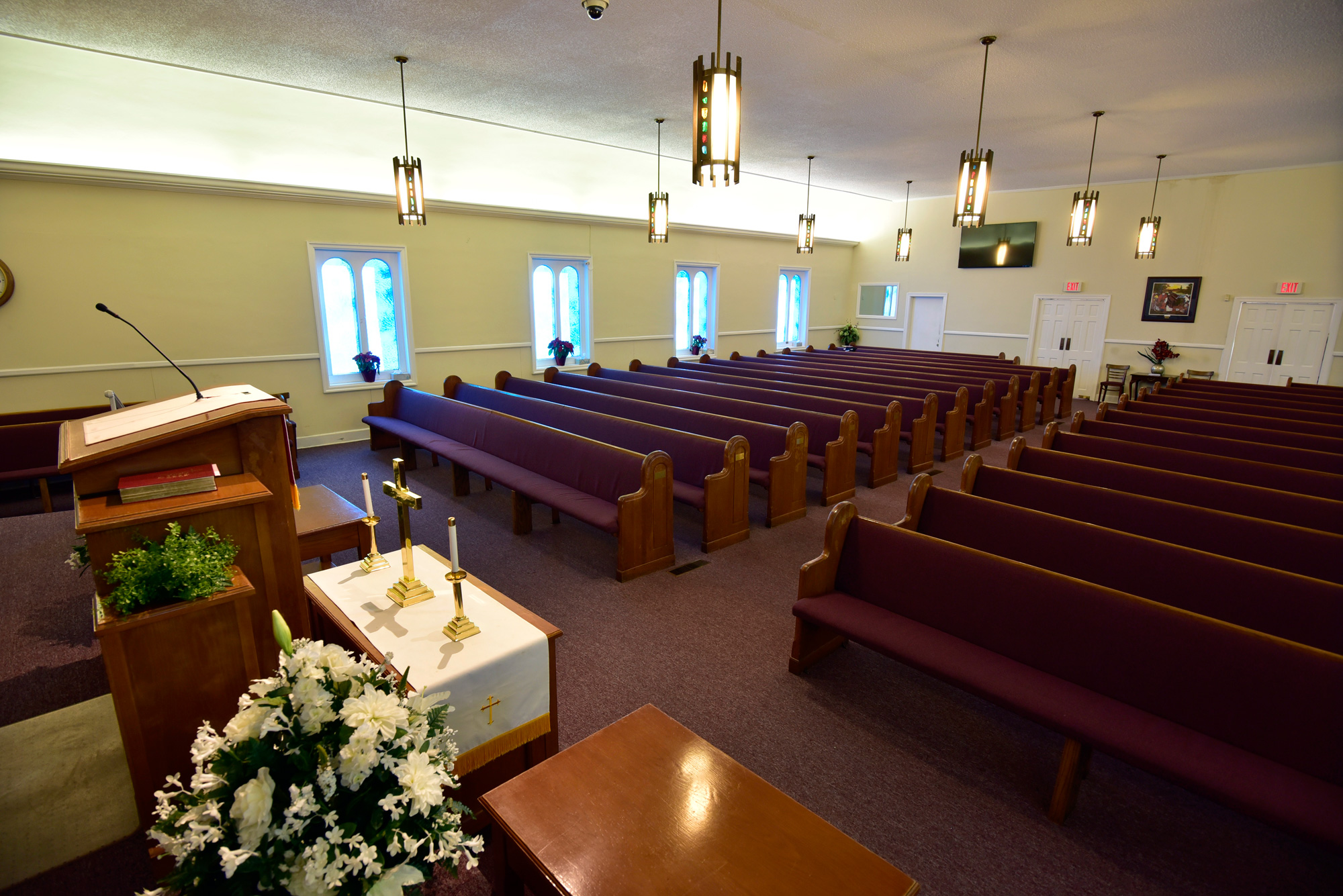
Shiloh Missionary Baptist Church was another site where mass meetings were held during the Albany Movement. Working closely with Old Mt. Zion Baptist Church across the street on Whitney Avenue, both churches held mass meetings with crowds exceeding 1,500 people when Dr. Martin Luther King Jr. spoke to their members in 1961. A Georgia Historical Society Civil Rights Trail marker honoring the Albany Movement is located in front of the church. Shiloh hosts performances by the Freedom Singers during Black History Month and annual Martin Luther King Jr. celebrations.
Atlanta
Martin Luther King, Jr. National Historical Park
The experience at the Martin Luther King, Jr. National Historical Park begins when visitors approach the Visitors Center, passing by the Civil Rights Walk of Fame with shoe imprints of pioneers in the American Civil Rights Movement noted in the pavement. Along the walk is a statue of Mahatma Gandhi with inscribed quotes from the India leader who greatly influenced King's nonviolent movement for social change.
Inside the center, travelers can view a video presentation about the movement and see the multimedia exhibit "Courage to Lead," or youth can experience the "Children of Courage" exhibit. Families also can walk down Freedom Road. At the information desk, reserve your space for a guided tour of King's birth home. The Visitor Center is surrounded by pathways and the International World Peace Rose Garden that leads to the Historic Ebenezer Baptist Church.
Martin Luther King, Jr. Birth Home
Martin Luther King, Jr. was born at the home of his maternal grandparents, A.D. and Jennie Williams, on Jan. 15, 1929. A.D. Williams purchased the house in 1909. When Martin Luther King, Sr. married Alberta Williams, the King family moved into the house on Auburn Avenue, where they lived until 1941. The birth home is one block east of Historic Ebenezer Baptist Church in the residential section of the Auburn Avenue Historic District. It is a two-story house with a front porch, parlor, study, kitchen, dining room, bedroom and bathroom on the first level. The second floor includes four bedrooms and a bathroom.
Note: tours of the birth home are suspended until January 2026 while the home is rehabilitated.
The King Center
In 1968, Coretta Scott King established the Martin Luther King, Jr. Center for Nonviolent Social Change (The King Center), and it moved to its present location in 1981 adjacent to Historic Ebenezer Baptist Church and the National Historical Park. It contains an outdoor memorial with Dr. Martin Luther King, Jr. and his wife Coretta Scott King’s crypt surrounded by reflecting pools and an eternal flame. A walkway leads visitors into Freedom Hall, where art from Africa and Georgia is displayed in the Grand Foyer, and special programs are held inside the large theater/auditorium. The King Center has a bookstore/gift shop and resource center on the ground level. Exhibits on the second floor honor Dr. and Mrs. King, Mahatma Gandhi and Rosa Parks.
Historic Ebenezer Baptist Church
Historic Ebenezer Baptist Church is one of the buildings that comprise the Martin Luther King, Jr. National Historical Park. The three-story, red brick structure was built in 1914 and completed in 1922 under the leadership of Reverend A.D. Williams, the church’s second pastor. Rev. A.D. Williams led the historic Ebenezer Baptist Church from 1894 until his sudden death in 1931. Rev. Martin Luther King, Sr. was Ebenezer's third pastor, leading the church from 1933 until he retired in 1975. His son, Dr. Martin Luther King, Jr., served as co-pastor in 1947 until he attended Crozer Theological Seminary. Martin Luther King, Jr. co-pastored Ebenezer again with his father from 1960 until his assassination on April 4, 1968.
Madame C.J. Walker Museum/WERD Studio
The Madame C.J. Walker Museum/WERD Radio Studio is located in an original Madame C.J. Walker beauty shop from the 1950s. The museum pays tribute to Madame C.J. Walker, an early 20th-century woman who became one of the first self-made female African American millionaires. WERD Radio was the first radio station in the United States owned and operated by African Americans. It was a venue for black music at a time when those musicians were seldom, if ever, played on white-owned stations and played a vital role in disseminating messages from Dr. Martin Luther King, Jr. Dr. King’s Southern Christian Leadership Conference (SCLC) was headquartered in the building, and WERD Radio aired his announcements by lowering a microphone from the station to Dr. King’s office below.
APEX Museum

The APEX Museum (African American Panoramic Experience) is located in the historic Atlanta School Book Depository building in the heart of the Atlanta's Sweet Auburn Historic District. Dedicated to telling the story of the people of the African Diaspora and their contributions to America and the world, the museum features rotating art and photographic exhibits.
Elbert P. Tuttle U.S. Court of Appeals Building
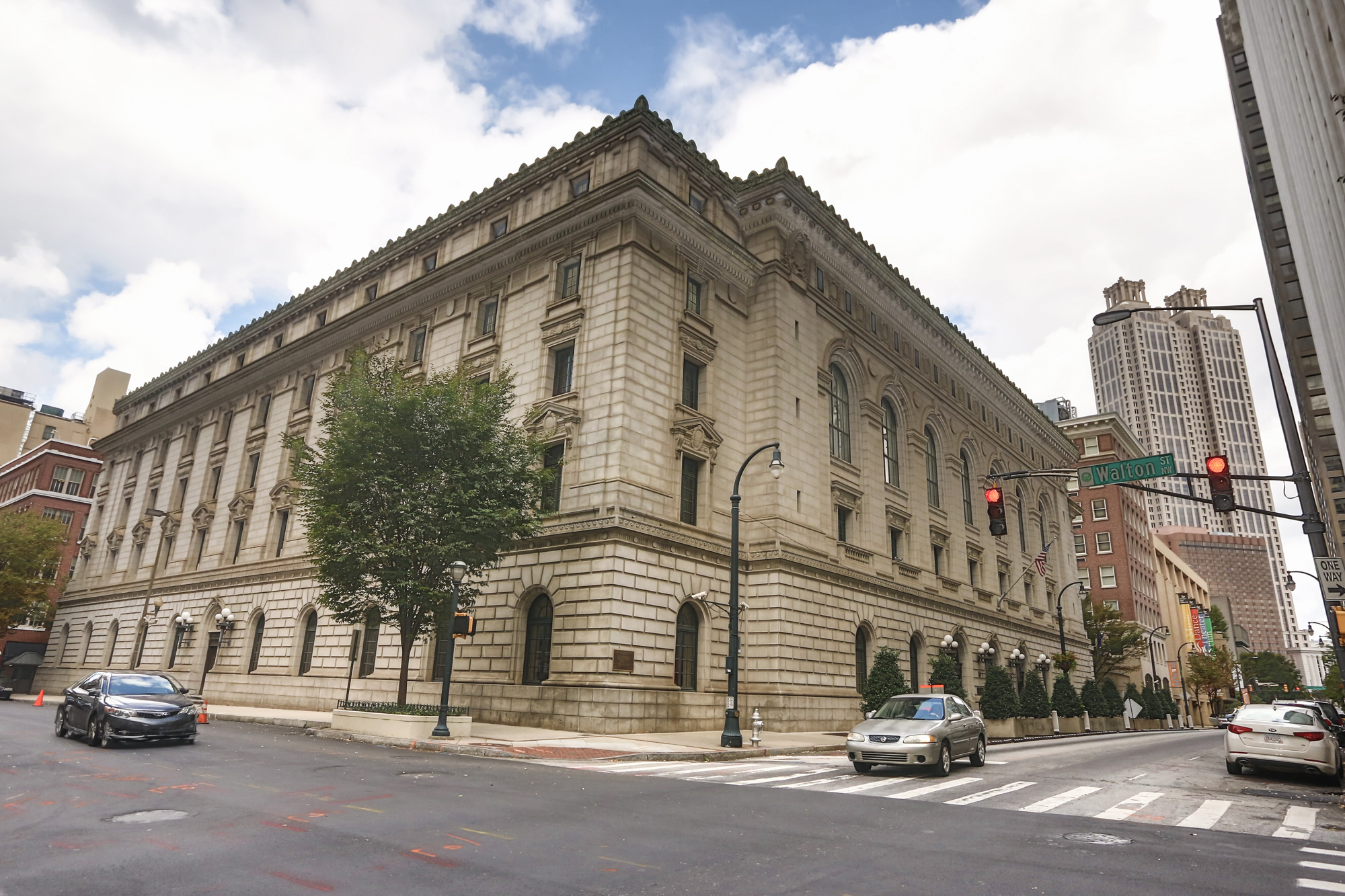
The U.S. Post Office and Courthouse was completed in 1910 as an early 20th century federal building in downtown Atlanta. The building presently houses the 11th Circuit Court of Appeals, and a research library occupies the basement where post office rooms and sorting bins were located. The building was the location of the Fifth Circuit Court of Appeals during the American Civil Rights Movement. It is a National Historic Landmark because the court enforced Brown v. Board of Education and implemented nationally significant civil rights legislation. Elbert Parr Tuttle administered the court in the 1960s and authored significant court opinions that overcame massive resistance in school desegregation and voting rights cases. An exhibit on Judge Tuttle and his civil rights achievements is located on the third floor outside the appellate courtroom.
National Center for Civil and Human Rights

The National Center for Civil and Human Rights is dedicated to the achievements of the American Civil Rights Movement as well as the worldwide human rights movement. Opened in 2014, the center is located at Pemberton Place, a site donated by the Coca-Cola Company, which links it to nearby attractions, including the Georgia Aquarium, the World of Coca-Cola and Centennial Olympic Park.
"A Committed Live: The Morehouse College Martin Luther King, Jr. Collection" exhibit features rotating artifacts that are associated with Dr. King from his youth through his assassination. "Rolls Down Like Water: The U.S. Civil Rights Movement" gallery focuses on significant events in the movement augmented by interactive exhibits, such as a lunch counter sit-in. "Everyone. Everywhere: Global Human Rights " gallery spotlights human rights defenders worldwide.
Jimmy Carter Presidential Library & Museum (The Carter Center)

The Jimmy Carter Presidential Library & Museum is the repository of information and historical materials from the Carter presidency. Opened in 1986, the library archives include more than 27 million pages of documents related to the Carter presidency that curators make available to researchers. The museum exhibits photographs, a life-size replica of the Oval Office, videos and rotating material from the collection.
Midway
Dorchester Academy Boys' Dormitory
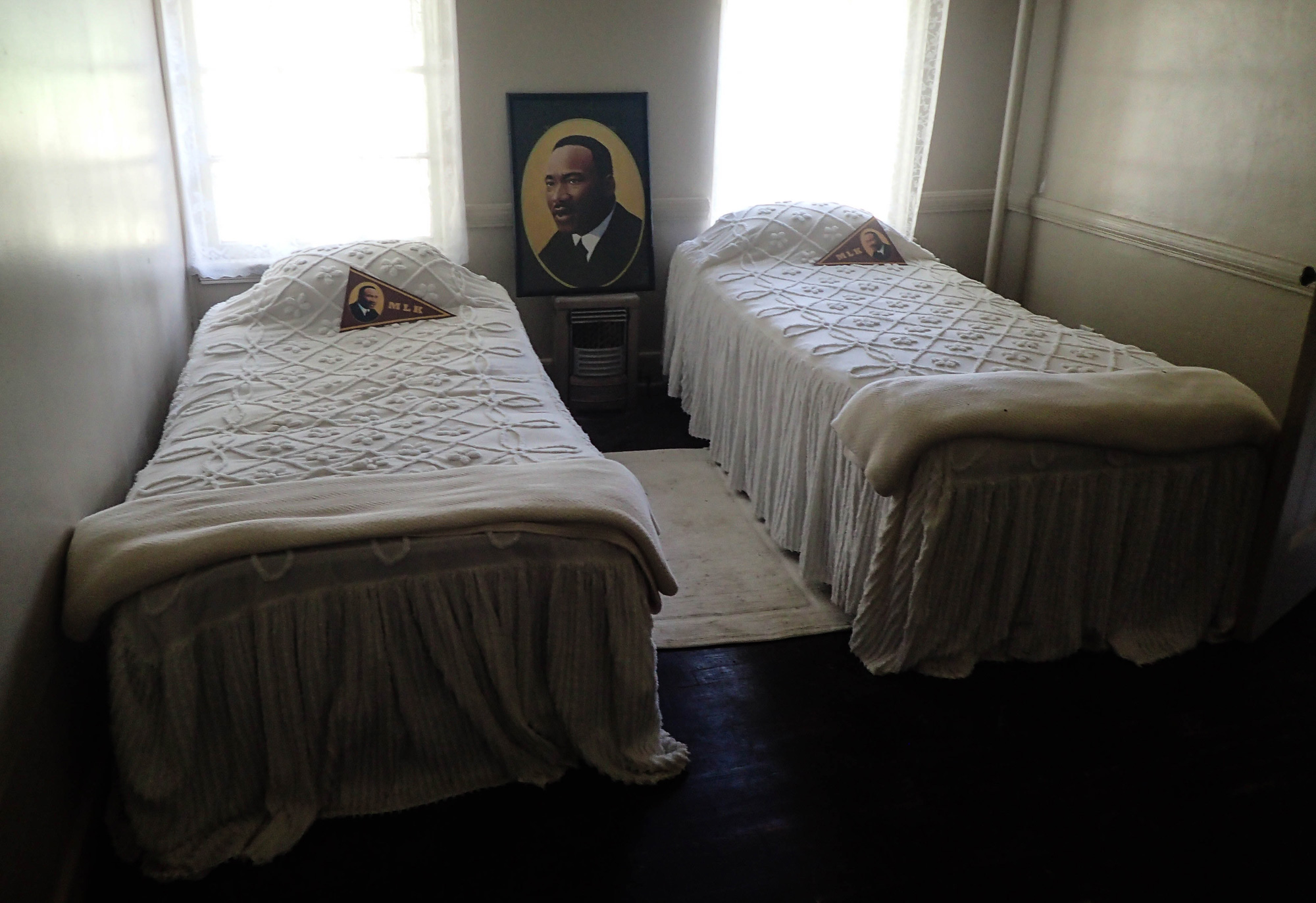
Dorchester Academy, established in 1868, was one of the earliest private schools that educated freedmen. Today, the two remaining buildings on the 30-acre campus are the 1934 boys’ dormitory, a National Historic Landmark, and the principal’s residence that is the Dorchester Museum. When the school closed in 1940, the dormitory became the Dorchester Cooperative Center, a hub for voter registration drives.
Dorchester Academy was the host site for Southern Christian Leadership Conference (SCLC) adult literacy and voter registration seminars led by Septima Clark. Rev. Andrew Young administered the program, and SCLC Director of Education Dorothy Cotton recruited students in the Citizenship Education Program. Martin Luther King, Jr. was frequently the keynote speaker at the conclusion of weeklong citizenship classes at Dorchester and funneled potential students through the People-to-People tours he led for the SCLC Voter Education Project.
In January 1963, SCLC Executive Director Wyatt Tee Walker and 11 SCLC staff, including King, Abernathy and Young, met at Dorchester and planned the strategy for the Birmingham Campaign. When violence erupted in Birmingham, Congress ultimately passed the Civil Rights Act of 1964.
Find out more about the U.S. Civil Rights Trail, including more than 100 attractions in 16 states, at civilrightstrail.com.
PIN THIS

